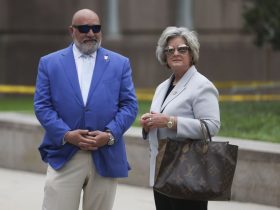The Senate on Thursday confirmed three more senior military officers in its latest move to bypass an expansive blockade on President Biden’s nominees imposed by Sen. Tommy Tuberville (R-Ala.) in a bid to gain leverage in a fight over the Pentagon’s travel policy for troops seeking abortions.
Approved by lopsided margins were Adm. Lisa Franchetti, who will become the first woman to lead the Navy and join the Joint Chiefs of Staff; Gen. David W. Allvin, nominated to lead the Air Force; and Lt. Gen. Christopher J. Mahoney, who will be promoted to four-star general, become the Marine Corps’s No. 2 officer and step in as the caretaker commandant in the absence of Gen. Eric Smith, who suffered apparent cardiac arrest on Sunday. Smith, 58, was in stable condition on Wednesday evening with an unclear long-term prognosis.
Deputy Defense Secretary Kathleen Hicks, the Pentagon’s No. 2 political appointee, appeared to link the hold on Thursday directly to Smith’s condition.
“We’ve said many times in the last six months that the hold is unnecessary, unprecedented and unsafe, and that it’s bad for our military and bad for our military families, and it’s bad for our country,” she said. “We have seen tragic effects of that stress, but we’ve also seen stress at the individual human level. And I think that’s been well-communicated on Capitol Hill.”
Each of the officers confirmed on Thursday is considered highly qualified.
Franchetti, 59, has served as the vice chief of naval operations since September 2022, and has commanded naval forces all over the world as a surface warfare officer. She will take over a service that is increasingly focused on operations in the Pacific, as the Pentagon adjusts to a rising military competition with China. The Senate confirmed her by a vote of 95-1 on Thursday.
Allvin, 60, served as a cargo pilot and led increasingly large units before becoming vice chief of staff in the Air Force in November 2020. His confirmation passed 95-1.
Mahoney, 58, has served as the Marine Corps deputy commandant for programs and resources since August 2021, overseeing the service’s budget. A fighter pilot, he has extensive service in the Pacific and graduated from the Naval Fighter Weapons School, commonly known as Top Gun. Mahoney was confirmed with an 86-0 vote.
The confirmation votes came amid mounting frustration among fellow Republicans at Tuberville’s tactics. Over nearly five hours on the Senate floor on Wednesday night, Sen. Dan Sullivan (Alaska), Sen. Joni Ernst (Iowa) and other GOP colleagues denounced the gambit and said Tuberville had other options to protest policy decisions. They echoed concerns of the White House and Senate Democrats that Tuberville is undercutting U.S. military readiness at a time when wars are raging in the Middle East and Ukraine.
Tuberville initiated the legislative blockade in February, preventing the Senate from using its typical process for approving uncontroversial nominees in batches of dozens or hundreds at a time. The number of military officers ensnared by the logjam has risen to more than 370 and includes positions spanning commands worldwide. The Pentagon estimates that by the end of the year, about three-quarters of the generals and admirals in the Defense Department — 650 of 852 — will be affected if there is no resolution.
The Senate can bypass Tuberville’s hold by voting on officers individually, and had done so previously in three instances. Doing so for every frozen nomination, however, would take months and impede action on numerous other issues.
On Thursday, Ernst said she planned to continue offering nominations next week on the Senate floor. “We’ll keep going until, you know, the pressure continues to build,” she said.
Leaving the Capitol on Thursday, Tuberville expressed annoyance with the opposition. “I’ve been doing this for nine months and all of a sudden they’re mad?” he said, leaving out that several of his Republican colleagues said Wednesday night that they had tried privately for months to nudge Tuberville to another form of protest.
Tuberville also took issue with the idea that Smith’s medical emergency was the result of the senator’s actions. The general had effectively held the role of both the commandant and assistant commandant of the Marine Corps for several months, and said that he did not think doing so was “sustainable.”
“C’mon, gimme a break,” Tuberville told reporters. “This guy is going to work 18, 20 hours a day no matter what. That’s what we do. I did that for years because you’ve got to get the job done.”
In a statement, his office later claimed credit for forcing Senate Majority Leader Charles E. Schumer (D.-N.Y.) to hold the confirmation vote for Mahoney by filing a petition. Republicans have voiced frustration with Schumer for not bringing some of the military’s nominees to the floor for individual votes more quickly.
At a briefing for reporters Thursday, White House press secretary Karine Jean-Pierre said Tuberville’s actions are “causing stress and disruption to our military families across the chain of command and for military spouses and also their families.”
“The world is too dangerous,” she said. “It is too dangerous to play political games with our military. So we are pleased to see that the Senate is taking action. Senator Tuberville needs to end to end this damaging hold … as soon as possible.”
Schumer told reporters Wednesday that he supports a Democratic proposal to allow the Senate to circumvent Tuberville’s hold and allow senators to vote on a large block of military nominees. The resolution, backed by Sen. Jack Reed (D-R.I.), chairman of the Senate Armed Services Committee, and Sen. Kyrsten Sinema (I-Ariz.), would need all Democrats and nine Republican votes to pass.
Any vote to go around Tuberville’s hold on the hundreds of other frozen nominations is probably weeks away, as it still needs to go through the committee process. Many Republican senators have rejected the idea, however, saying they believe it could weaken lawmakers’ power to stall nominations in the future.
Some Republicans have urged Tuberville to adjust tactics and focus instead on Biden’s proposed political appointments.
In a brief interview Wednesday, Tuberville said he has no intent to change course. “We’re not going to start backing up now just because people are starting to get cold feet … on my side” of the political aisle. He held firmly to this position as the evening’s theatrics wore on, declaring “I object” each time as his GOP colleagues, most with military backgrounds themselves, proposed an individual officer for a promotion.
Liz Goodwin contributed to this report.








